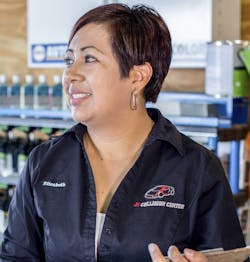As she wrote her signature, Elizabeth Mayoral was on the verge of tears.
“Writing that check was one of the hardest things I ever had to do,” she says. “It was honestly one of the worst days of my life.”
To put yourself in Mayoral’s shoes: You immigrated from Mexico with your husband at the age of 18. Nothing has ever been easy for you. Your husband utilized his repair skills to advance at various collision shops. And then, finally, 20 years later, with just $800 and a toolbox, you both made a gigantic leap of faith and took over your very own collision repair facility, JC Collision Center USA in Bakersfield, Calif. And then one person almost squashes everything.
This particular person, who was hired as an estimator in September 2015, didn’t remain there long. But the damage was done by the time he left: This “estimator” was actually an area shop owner who, in addition to driving customers to his own shop, had been overcharging customers at JC Collision and pocketing the money. He had also ruined several customer relationships, including a fleet account the $500,000 business extremely depended on.
To avoid legal issues once the estimator left, Mayoral sucked up her pride and wrote the man that check for his hours. The tears weren’t about the money—after years of hard, honest, ethical work, the Mayorals felt betrayed.
But almost one year has passed, and JC Collision has not only grown from the experience, but strengthened its standing in the community and improved its hiring tactics to ensure this never happens again.
The Backstory
The shop pulls in a modest $500,000, but Mayoral says they are poised for growth after winning “Family Owned Business of the Year” through the 2016 Kern County Small Business Success Awards, due to their “hard work, ethical behavior and intelligent management,” said the Kern County Hispanic Chamber of Commerce.
The Problem
After a previous estimator unexpectedly quit, Mayoral hired the new estimator out of desperation. He was the only quality applicant and Francisco hired him after the first interview without calling references. She now assumes the man forged his résumé.
He was hired part-time, splitting estimating duties with Mayoral, and she started noticing abnormalities when he showed up for work during outside assigned hours.
“He said, ‘If you want me to produce the income you want from me, then I need to be here to take care of customers,’” she recalls. “‘Don’t worry about the hours. I’m not going to charge you for those hours. I’m just here to make this business succeed.’”
Mayoral mistook his selfish intentions for drive and initiative. Eventually, she noticed the new employee was taking customers outside to (she assumes) make deals on the side.
“I’d ask, ‘What happened?’ and he’d say, ‘They’re going to bring it in on Monday.’ But they never came back,” she says.
After a couple months of odd behavior, Mayoral called area shops and appraisers, inquiring about her estimator, only to find he owned a local automotive shop. She then let him go, paid him $7,000 for his final paycheck (he charged for overtime) and assessed the damage, which included several customers inquiring about abnormally high charges and a local fleet account that was billed an extra $3,000 for a supplement charge.
JC Collision Center USA
—Location: Bakersfield, Calif.
Staff: 6 (1 technician, 1 painter, 1 prepper, 1 CSR/estimator, 2 owners)
Average Monthly Car Count: 15-20
Annual Revenue: $500,000
The Solution
Mayoral was not interested in pursuing legal action, as she thought it would reflect poorly on her shop. Instead, she chose to take a long, hard look at her business and work from within. Her solution involved two components that she says made her shop stronger: bringing back lost customers, and revamping the shop’s hiring process.
The biggest issue Mayoral addressed was the shop’s sole fleet account, which accounted for much of JC’s business and had decided to part ways after the overcharge. Mayoral hired a consultant to come in, go through the estimate line by line and point out discrepancies.
“So we went and talked to them in person and apologized and explained to them he was no longer with us, he was not doing the job, that we had hired someone who had a good reputation to come in and perform an audit,” she says. “We promised it would never happen again, and thanks to that we got the company back.”
Next was going through the past bills and contacting any customers where Mayoral noted unethical behavior. The shop wrote checks for overcharges that occurred, and ensured customers that the estimator did not represent JC Collision’s values.
She extended this message to the Chamber of Commerce, where she gained many business advocates who rallied around her story. She claims she actually received many referrals based on how she handled the situation.
On the human resources side, Mayoral is now dedicated to finding the most qualified employees that fit into the shop culture.
She started by revamping the shop’s job advertisements, which went from vague to heavy with details about job duties and requirements. She says being thorough immediately weeds out job drifters, and has attracted more quality applicants looking to be challenged. She asks for a résumé, a cover letter and multiple references.
“We start calling those references right away so we don’t have any problems,” she says.
Now the shop interviews several applicants, as opposed to one or two. And nobody is hired without coming in for a second round of questions. When applicants interview, Mayoral hands them a hiring package, which contains information about JC Collision, its philosophies and standards, details about its repair process, and, once again, lays out all the job duties.
A huge part of finding the right employees has been changing how she ask questions during interviews, Mayoral says.
“I hired a consultant, and he gave me a lot of tools for hiring and asking a ton of questions I would have never asked,” she says. “Like, ‘What was your first impression of our shop?’ ‘What is the first thing you did to earn money?’ ‘What was your first job?’ Questions that tell me about their personality and let me know if they’ll be a good fit.”
Once an employee is hired, Mayoral introduces a 90-day probationary period. Mayoral not only communicates the shop’s ethical standards, but introduces benchmarks and goals the new employee is expected to meet. He or she is evaluated through documentation for 90 days, at the end of which Mayoral will reassess the employee and have a one-on-one meeting about his or her future.
In addition, she makes all new employees sign a confidentiality form, which she says will protect the shop legally if shop processes or financial information are leaked to competing businesses.
The Aftermath
Retaining individual customers and the fleet account saved the business close to $50,000, Mayoral estimates. On top of that, she says referrals are up since reaching out to customers and her Chamber of Commerce, which played a large role in JC Collision winning “Family Owned Business of the Year.” The revamped hiring approach has landed the shop a new full-time prepper and a recently hired customer service representative/estimator. She says new employees quickly integrate into the shop’s system and philosophies, and she believes the process will lead to long-term employees.
“They’ve been really good fits for our shop,” she says. “They like working in our system. They see we’re poised for growth.”
The Takeaway
The biggest lesson Mayoral learned was the importance of documentation and follow-up, which would have allowed her to spot the estimator’s ill intentions beforehand.
Although she felt taken advantage of at the time, Mayoral says she now views signing that check as a blessing, as now she and Francisco can look toward the future and build their business.
“It really kickstarted a lot of changes,” she says. “We’ve been open one year, and we’re still trying to figure out how to run this business. But we’re getting there.”
Expert Advice
Crafting Confidentiality Agreements
—
Chad A. Snyder, founding partner of Rubric Legal LLC in Minneapolis, has seen enough confidentiality agreements to know what will hold up in court. If you’ve got trade secrets and information you want to protect, he says to take these precautionary steps.
If you’re somebody that has trade secrets that need protecting, my advice is to talk to a lawyer to construct an agreement that defines them appropriately, so you’ve got an enforceable agreement.
The most important thing in any contract is spelling out what you mean in words that people understand. There does seem to be a belief that if you make something sound really complicated, it’s more impressive. Really, if people can’t figure out what the contract means, it’s going to be construed against the employer and in favor of the employee. In plain language: What is it you’re trying to protect? Spell it out. If you’ve got specific things you regard as confidential, put them in the agreement.
You need to make part of your practice that you treat these things as confidential. It’s not information just sitting out where anybody can get it. It’s not distributed or made available to employees who haven’t signed this agreement or don’t have these restrictions. If you don’t absolutely protect it, then courts often say, “Well, if you didn’t treat it as confidential, then I’m not going to now.”
Every confidentiality agreement for your business should contain:
- Agreement effective date
- Names and addresses of parties
- Type of business the parties are engaged in
- The reasons confidential information is being disclosed
- Length of time the information will be protected

